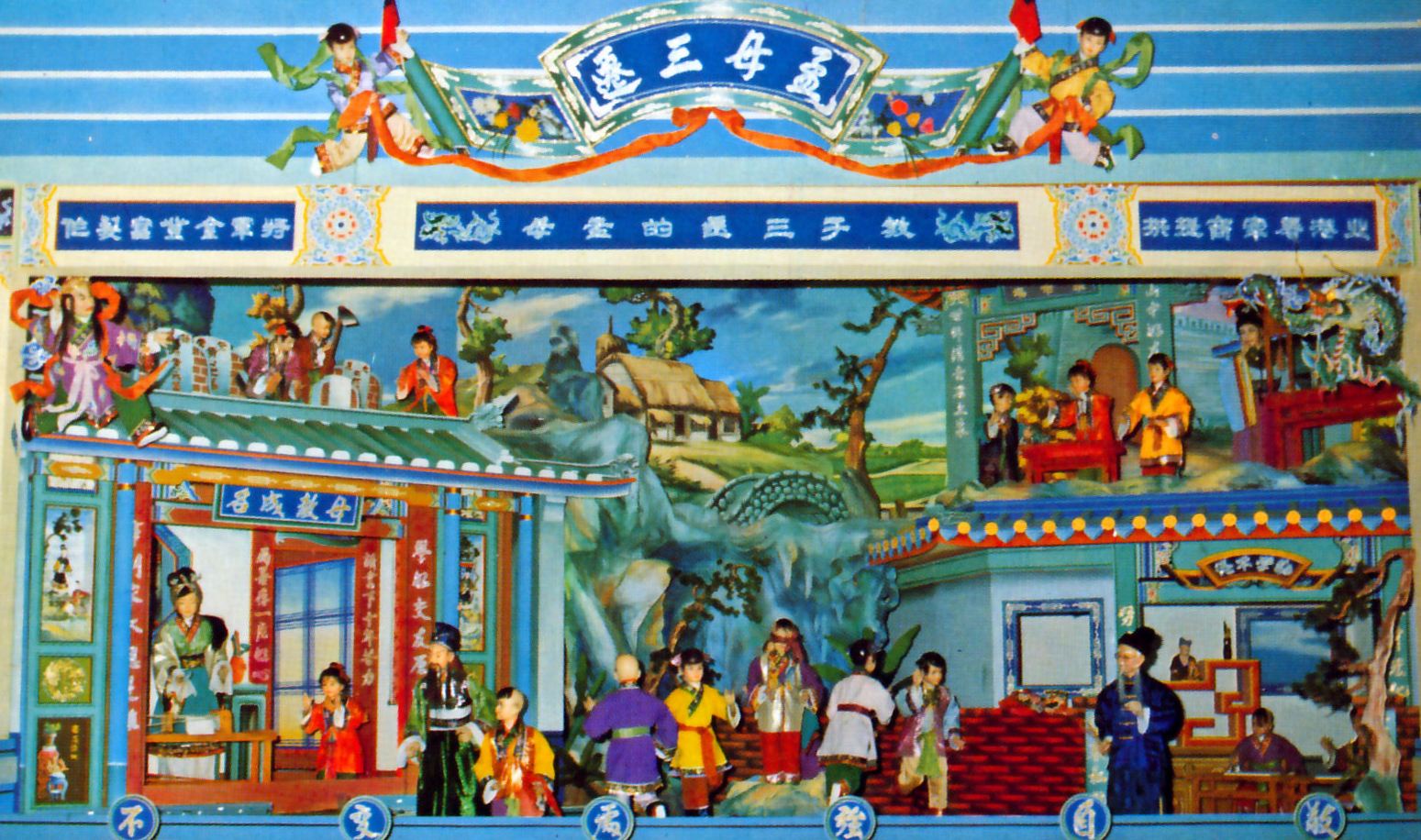 Diorama of Mencius’ mother’s moves to find only the best playmates for her son. Upper-left: graveyard; upper-right: market; lower-left: The Mèng household; lower-right: school
Diorama of Mencius’ mother’s moves to find only the best playmates for her son. Upper-left: graveyard; upper-right: market; lower-left: The Mèng household; lower-right: school(Cháotiān Gōng Temple, Běigǎng, Taiwan 臺灣北港朝天宮, 1970s)
MÈNG Kē 孟轲 = The famous philosopher Mencius (Mèngzǐ 孟子, 372–289 BC), still a small child.
MÈNG Jī 孟激 = his father, a man with a distinguished genealogy but little money (deceased)
MÈNG Mǔ 孟母 (= Lady ZHǍNG 仉) = “Mother Mèng,” Mencius’ mother, MÈNG Jī’s widow, one of 125 women described in Liú Xiàng’s 刘向 Biographies of Exemplary Women (Liènǚ Zhuàn 列女传 (18± BC)
Lots of influential playmates
The Great philosopher Mencius (Mèngzǐ 孟子) was born in the town of Zōuchéng 邹城, about a day’s journey from the birthplace of Confucius in the state of Lǔ 鲁 in modern Shāndōng 山东 province
It is said that Mencius’ father MÈNG Jī 孟激 (and therefore Mencius himself) was descended from Duke Yáng 炀公 of the State of Lǔ 鲁, who was a son of Bó Qín 伯禽, a member of the ruling family of the Zhōu 周 dynasty, who was sometimes known as Father Qín 禽父 because he was assigned the task of founding the feudal subordinate state of Lǔ in the long ago.
But like many people with distinguished ancestors, Mèng Jī was poor.
No one knows what happened on the day that Mencius was born. Perhaps colored clouds appeared in the sky. Perhaps fabulous animals were seen on earth. But historians all agree that Mencius’ mother —like mothers all through history— was certain that her son was a prodigy, or could be made into one.
Historians also agree that not long after Mencius was born, his father died, leaving his wife to see to the project of making sure that their little son would fulfil his obviously magnificent destiny.
Three important stories stand as examples to all parents through history:
When his father died, Mencius and his mother lived near a cemetery, and she was reportedly appalled when she discovered that the neighborhood children played at wailing like mourners or pretended to conduct funerals. But everything about death is polluting, and no mother would want her child to become a professional in such a business. So she moved.
But their new dwelling was near a market where the children played at commerce, bartering and hawking. Commerce was traditionally a low-prestige occupation in the view of Confucians, and certainly incompatible with becoming a great philosopher, so she moved again, finally settling beside a school.
While they were still too young for real classes, the children in this neighborhood imitated school in their play, sometimes practicing etiquette rituals,and sometimes sitting demurely pretending to memorize wise books. Mencius’ mother was delighted and made this their permanent home.Perhaps as a result, Mencius became a great philosopher.
There are of course elaborations of this story. One variant, for example, has little Mencius befriending a butcher at the market and the last straw comes when his mother catches him making little clay pigs, chopping them up, and pretending to sell them as pork. This adds widespread ambivalence about the morality of butchery to the undesirability of letting a child be influenced by the market
The implied instruction to parents is summarized in the frequent expression “Mencius’ mother moved three times” (Mèng mǔ sān qiān 孟母三迁).
 Diorama of Mencius’ mother’s moves to find only the best playmates for her son. Upper-left: graveyard; upper-right: market; lower-left: The Mèng household; lower-right: school
Diorama of Mencius’ mother’s moves to find only the best playmates for her son. Upper-left: graveyard; upper-right: market; lower-left: The Mèng household; lower-right: schoolWhen he actually started attending school, little Mencius, despite his important destiny, was not always perfectly engaged, and it is said that on occasion he played truant. When his mother discovered this, she called him in to her loom, took up her scissors, and cut up the cloth she had been weaving. One achieves nothing, she told him, if one does not finish what one begins, or does not assiduously stick to the task. Little Mencius was very much ashamed, and never missed class again.
Some people tell another story, one that took place, they say, long after Mencius was married to the wife his mother had selected for him. Mencius returned from an errand one day and discovered that his wife, thinking she was alone, was not sitting posed as a good Confucian lady ought, and so, being a good Confucian gentleman, he demanded a divorce.
His mother, however, pointed out that The Book of Rites (Lǐ Jì 礼记) clearly prescribed that a person entering a room must make a noise to ensure that his arrival is anticipated. By entering in silence, it was Mencius who was behaving improperly. Indeed, a person who enters in silence has no right to know whether his wife is sitting one way or another. Shamed once again by his mother, the great philosopher admitted his error and did not divorce his wife.